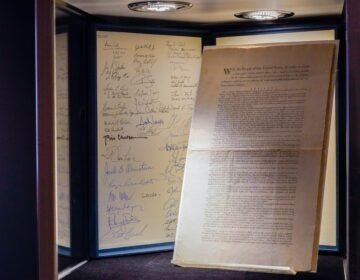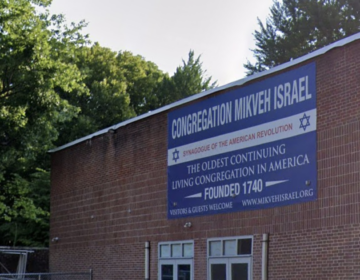As hate crimes increase, faith leaders come to Philly security summit
-
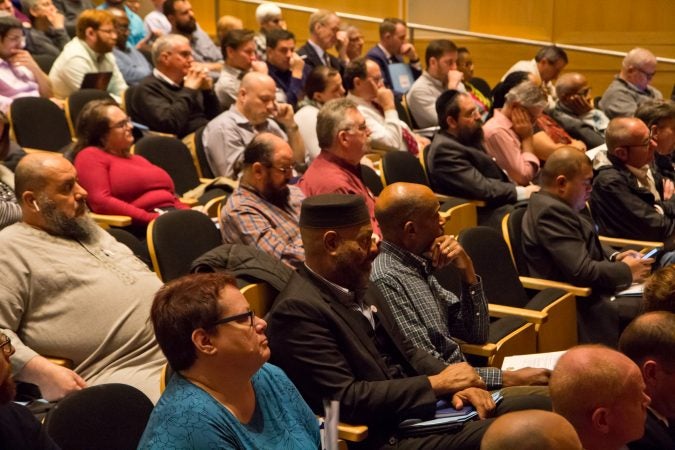
The Anti-Defamation League, U.S. Attorney’s Office for the Eastern District of Pennsylvania and the Delaware Valley Intelligence Center hosted an informational event on making religious institutions and communities more secure at the National Constitution Center in Philadelphia. (Kimberly Paynter/WHYY)
-
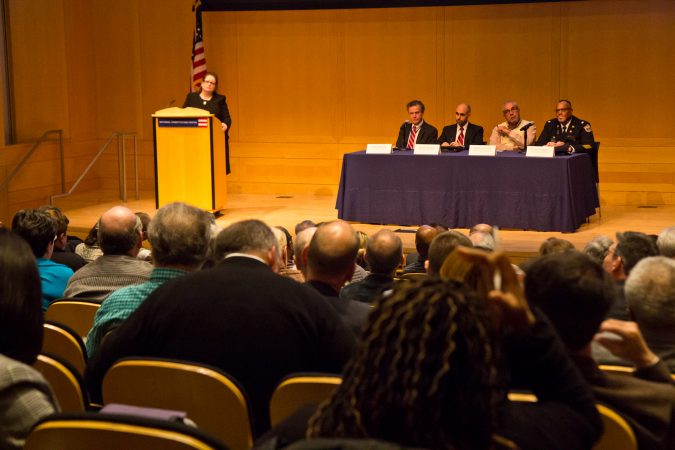
The Anti-Defamation League, U.S. Attorney’s Office for the Eastern District of Pennsylvania and the Delaware Valley Intelligence Center hosted an informational event on making religious institutions and communities more secure at the National Constitution Center in Philadelphia. (Kimberly Paynter/WHYY)
-
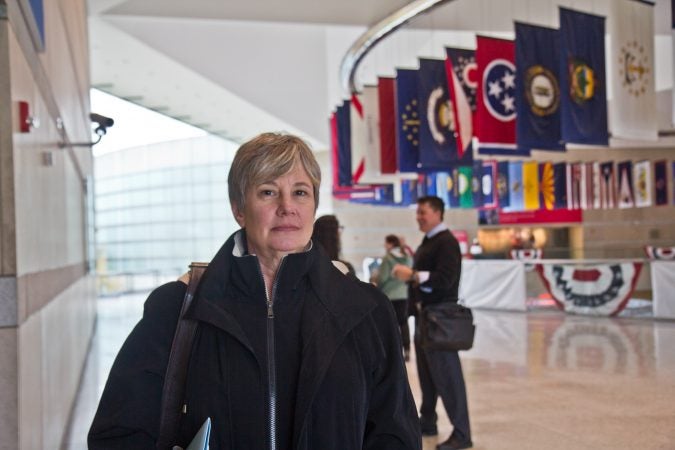
Beth Lyon is the pastor of Glenside United Church of Christ. (Kimberly Paynter/WHYY)
For the third straight year, hate crimes are happening more frequently. They increased by about 17 percent in 2017, according to U.S authorities.
Nearly 60 percent of those crimes were motivated by race or ethnicity, and 21 percent stemmed from religious bias.
Those statistics from the FBI’s annual report on hate crimes came to light Tuesday at a conference in Philadelphia aimed at making churches, synagogues, mosques and other religious institutions safer.
The National Constitution Center’s auditorium was packed with more than 200 leaders from about 150 religious organizations for the half-day summit.
“Securing Sacred Spaces and Places” was hosted by the regional chapter of the Anti-Defamation League, the Delaware Valley Intelligence Center and the U. S. District Attorney’s Office for the Eastern District of Pennsylvania.
Jeremy Bannett, associate regional director for ADL of Philadelphia, said the conference was planned before the recent attack on a synagogue in Pittsburgh. He said the group wanted to put on the event because it has seen anti-Semitism rising.
“Pennsylvania saw a 43 percent increase. New Jersey saw a 32 percent increase and actually has the third-highest total in the nation of anti-Semitic incidents,” he said. “Delaware actually saw a fourfold increase, going from single digits to double digits.”
The country has gone from historic lows for hate incidents to historic highs within just a few years. And that includes twice as many anti-Semitic incidents at schools and colleges, Bannett said.
The summit included a briefing on white supremacist threats against religious institutions and a panel on countering radicalization within communities. Organizers added an active shooter presentation after the mass killing at the Tree of Life synagogue in Pittsburgh.
Stephen Blocher, executive director of a synagogue in South Jersey, said leaders there have already implemented a number of security measures. However he said the Pittsburgh tragedy spurred him to make sure they haven’t overlooked any means of precaution.
“Although we have done a lot of work in the past few years, I’m going to go back again and reassess and reassess and make sure that everything we’re doing is — it’s never foolproof unfortunately — but there’s always room for improvement.”
Protecting the right of religious expression
Deputy U.S. Attorney of the Eastern District of Pennsylvania Louis Lappen said his office takes “very seriously” the prosecution and prevention of hate crimes.
“One of our most cherished rights in America is the right for religious expression, and that can’t mean anything at all if people can’t go to places of worship and pray in safety and security,” he said. “So that’s another reason why we are particularly focused on these kinds of crimes … it really just strikes at the heart of our freedoms and our rights as American citizens.”
Overall, violent crime has declined in the past 20 years in the country’s largest cities, Lappen said. But major cities — including Philadelphia — have seen a 12 increase in hate crimes.
Jews are the No. 1 target of crimes against religious groups, while African-Americans are the focus of most hate crimes overall, he said.
Pastor Beth Lyon of Glenside United Church of Christ, an LGBT-friendly church in Montgomery County, attended the Tuesday summit.
“We have a nice big rainbow flag outside our church, and our folks wonder, ‘Will that make us a target for somebody who has an agenda? How do we make ourselves safer?’” she said. “And I’m not sure that really was answered today.”
The program touched on big-picture issues that were helpful but not necessarily new, Lyon said.
“I’m not sure there are any good answers, and perhaps that’s why I’m not hearing them,” she said.
Bannett said the takeaway for faith-based groups is that they must make security part of the conversation and know there’s not just one solution.
WHYY is your source for fact-based, in-depth journalism and information. As a nonprofit organization, we rely on financial support from readers like you. Please give today.


